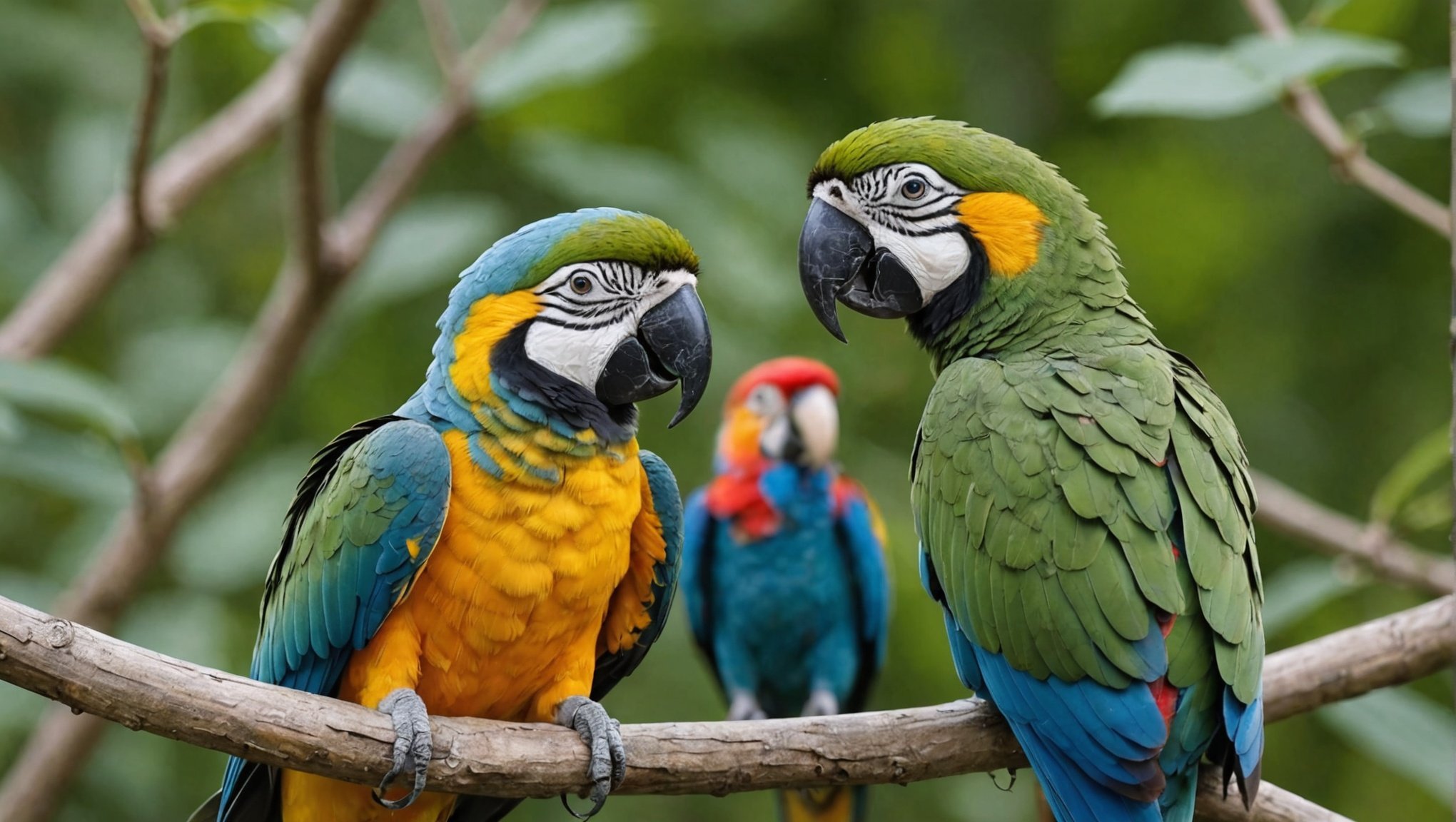Mastering Parrot Socialization: Essential Tips for Connecting with Humans and Fostering Friendships among Birds
Understanding Parrot Socialization
When it comes to parrots, socialization is not just a nicety, but a necessity. These intelligent and social birds thrive on interaction, whether it’s with their human caregivers or other birds. To truly connect with your parrot and foster meaningful relationships, you need to understand the fundamentals of parrot socialization.
The Importance of Early Socialization
Early socialization is crucial for parrots, much like it is for many other animals. The process of animal imprinting, as seen in precocial birds, highlights how young birds can attach themselves to the first moving object they encounter, often mistaking it for their parent.
Topic to read : Ultimate Guide to Insulating Your Dog House for Severe Winter Conditions
For parrots, this early socialization period is critical for their emotional and behavioral development. Here are some key points to consider:
- Interaction with Humans: From a young age, parrots need to interact with humans to develop trust and understand human behavior. This can involve simple activities like feeding, playing, and talking to the bird.
- Social Learning: Parrots learn by observing and imitating. Early exposure to various social situations helps them develop essential communication skills and behaviors.
- Reducing Fear and Aggression: Proper socialization can significantly reduce fear and aggression in parrots. A well-socialized parrot is more likely to be calm and friendly in new or stressful situations.
Building Strong Relationships with Your Parrot
Building a strong relationship with your parrot involves more than just providing food and shelter. Here are some strategies to help you connect deeply with your feathered friend.
This might interest you : Essential Tips for Safely Giving Medication to Your Trusting Senior Rabbit
Communication Skills
Effective communication is the cornerstone of any relationship, and it’s no different with parrots. Here are some tips to enhance your communication skills with your parrot:
- Learn Their Language: Understand the different sounds and behaviors your parrot uses to communicate. For example, an African Grey parrot is renowned for its ability to mimic human speech and understand context.
- Use Positive Reinforcement: Reward your parrot with treats, praise, or affection when they exhibit desired behaviors. This positive reinforcement encourages good communication skills.
- Engage in Small Talk: Talk to your parrot regularly, even if it’s just small talk. This helps the bird become accustomed to your voice and builds a sense of connection.
Feedback Sessions and Training
Regular feedback sessions and training are essential for the personal growth and development of your parrot.
- Training Sessions: Set aside dedicated time for training your parrot. This could include teaching tricks, practicing recall, or simply interacting in a playful manner.
- Feedback and Consistency: Provide consistent feedback during training sessions. Positive reinforcement works best when it is immediate and consistent.
- Be Patient: Learning takes time, so be patient with your parrot. Avoid punishing or scolding, as this can create negative associations and hinder the learning process.
Fostering Friendships Among Birds
If you have multiple parrots, fostering friendships among them can enrich their social life and provide emotional support.
Introducing Birds to Each Other
Introducing birds to each other requires careful planning to avoid conflicts.
- Gradual Introduction: Introduce the birds gradually, starting with visual introductions through cages or aviaries before allowing them to interact directly.
- Neutral Environment: Choose a neutral environment where neither bird feels territorial or threatened.
- Supervise Interactions: Always supervise interactions between birds, especially in the early stages, to ensure safety and prevent conflicts.
Creating a Harmonious Community
Creating a harmonious community among your parrots involves several key strategies:
- Shared Purpose: Ensure all birds have a shared purpose or activity, such as foraging for food or playing with toys. This helps build a sense of community and cooperation.
- Sufficient Space: Provide enough space for each bird to have its own territory without feeling overcrowded or competitive.
- Balanced Attention: Give balanced attention to each bird to avoid jealousy or resentment.
Practical Tips for Socializing Your Parrot
Here are some practical tips to help you socialize your parrot effectively:
Interact with Your Parrot Regularly
Regular interaction is crucial for building a strong bond with your parrot.
- Spend Quality Time: Spend quality time with your parrot daily, engaging in activities like playing, feeding, and simply talking.
- Involve Family Members: Involve other family members in the socialization process to help the parrot become comfortable with multiple people.
Use Socialization Strategies
Here are some specific strategies to enhance socialization:
- Expose to New Environments: Expose your parrot to new environments, such as different rooms or outdoor areas, to help them become confident in new settings.
- Introduce New People: Introduce your parrot to new people gradually, allowing them to become comfortable with various faces and voices.
- Engage in Community Activities: Participate in community activities, such as bird shows or social gatherings, to expose your parrot to other birds and people.
Table: Comparing Socialization Needs of Different Parrot Species
| Parrot Species | Socialization Needs | Interaction Style |
|---|---|---|
| African Grey | High socialization needs; requires consistent interaction and mental stimulation. | Intelligent and communicative; responds well to positive reinforcement. |
| Amazon Parrot | Needs regular social interaction to prevent behavioral problems. | Playful and affectionate; requires a lot of attention and exercise. |
| Cockatoo | Requires strong bonding with owners; can become very attached. | Emotional and demanding; needs regular interaction and emotional support. |
| Conure | Needs early socialization to develop good behavior; enjoys human interaction. | Playful and curious; benefits from a variety of toys and activities. |
Quotes and Anecdotes
Konrad Lorenz on Imprinting
Konrad Lorenz, the Austrian zoologist famous for his work on animal imprinting, once said, “The young bird does not know who its parents are; it uses environmental clues to both identify and attach itself to its protector.” This concept is crucial in understanding how young parrots can imprint on humans or other birds, highlighting the importance of early socialization.
A Personal Anecdote
“I remember when I first got my African Grey parrot, Max. He was just a year old and had already learned to mimic a few words. Over time, with consistent interaction and positive reinforcement, Max became an integral part of our family. He would greet us at the door, engage in small talk, and even help with simple tasks like fetching items. The bond we formed was incredible, and it all started with proper socialization.”
Mastering parrot socialization is a journey that requires patience, consistency, and a deep understanding of these intelligent and social birds. By following the tips outlined above, you can build strong relationships with your parrot, foster friendships among multiple birds, and create a harmonious and enriching social life for your feathered friends.
Don’t Forget the Basics
- Read and Learn: Continuously read and learn about parrot behavior, socialization techniques, and the specific needs of your parrot species.
- Join a Community: Join a parrot community or club to connect with other parrot owners, share experiences, and gain new insights.
- Seek Professional Help: If you encounter any behavioral issues or need personalized advice, don’t hesitate to seek help from a professional avian behaviorist.
By dedicating time and effort to socializing your parrot, you can ensure a happy, healthy, and fulfilling life for both you and your bird. Remember, socialization is a lifelong process, and with shared purpose and consistent interaction, you can build a strong and lasting bond with your parrot.







